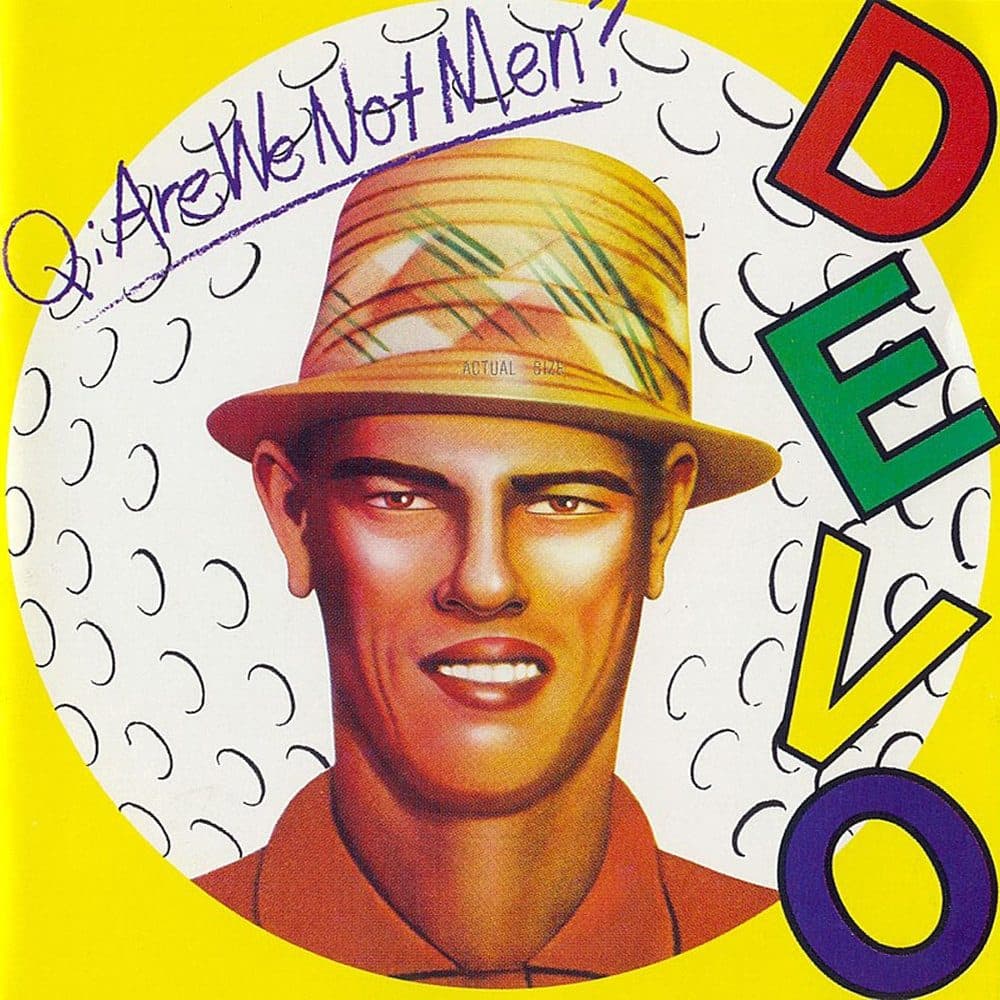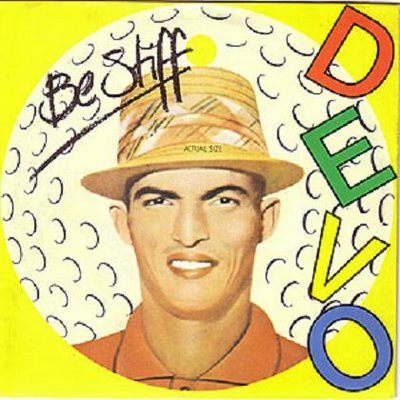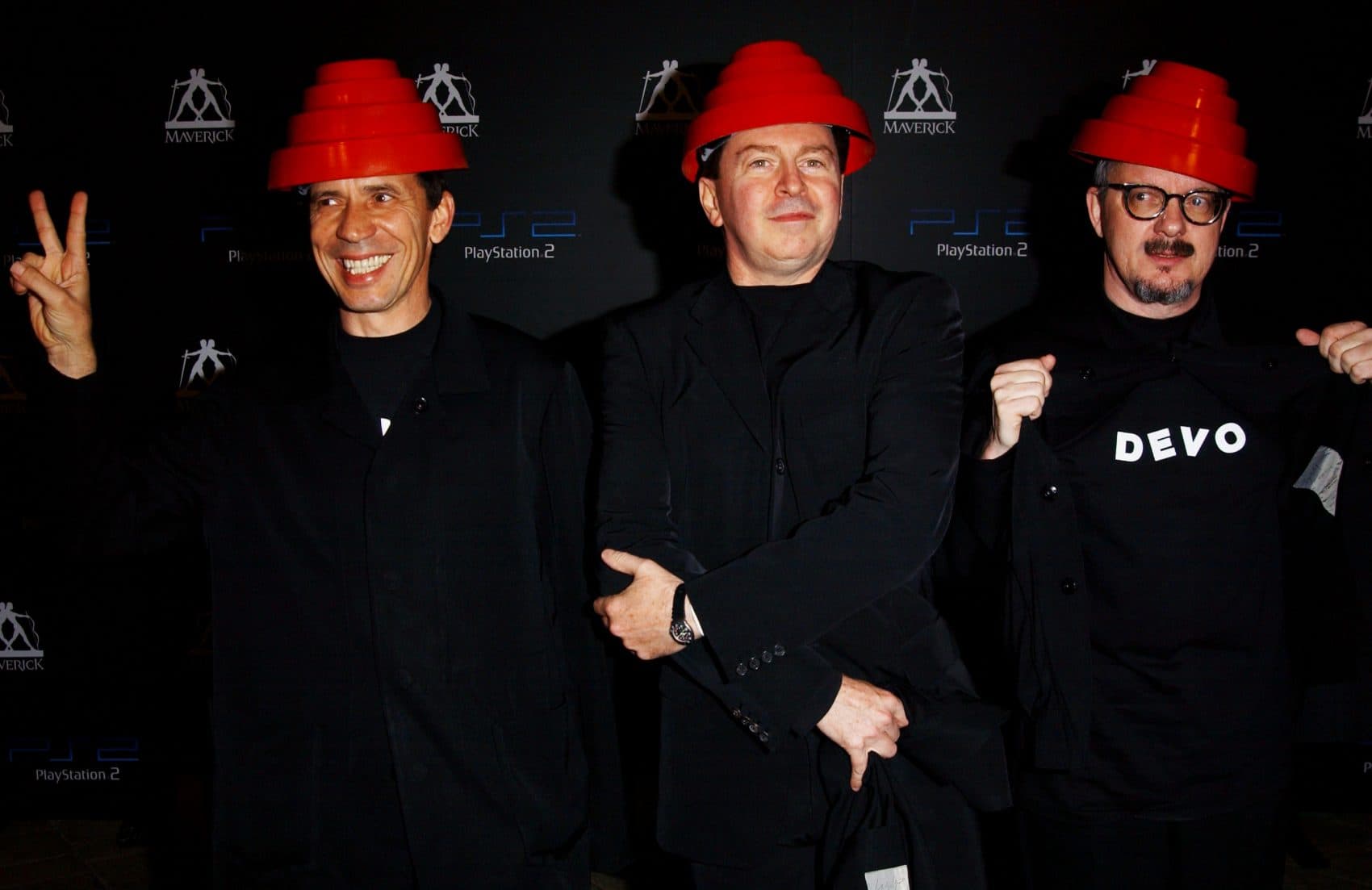Advertisement
The Devo De-Evolution Of Golfer Chi Chi Rodriguez
Resume
This story was re-broadcast on 9/5/2020 as part of The Best Of Only A Game. It originally aired on Aug. 26, 2017.
To understand what happened, you need to know that Devo has a pretty considered philosophy — and that is that the human race is in a state of de-evolution. Hence the name of the band. Their songs are about things like corporate control and blind conformity, and they were visual artists first, before they even wrote any songs. This was in the early '70s in Akron, Ohio.
So, one of the founders, Jerry Casale, says they were always trying to figure out what devolved art would look like.
'The One Guy Who Stood Out Was Chi Chi'
"You know, because we were very, very enamored — and put off at the same time — by pop culture, like the lowest end of, like, ad graphics, terrible TV commercials. So, we’re walking through the Kmart ..."
"Nope, it was the predecessor to Kmart. It was Click," says Mark Mothersbaugh, another founder of the band.
I should probably mention here that this was more than four decades ago, so a lot of the details are fuzzy for folks. Anyway, they’re in the department store...
"We were looking for supplies," Mark continues. "We were collaborating on a visual art piece together and walking through the sports section."
"And there’s these six practice golf balls in a clear, plastic pouch sealed shut at the top with a cardboard display head," Jerry says.
The kind that you hang on a metal hook. And on that display head is an illustration of the smiling face of the renowned golfer Chi Chi Rodriguez.
"I saw it and I just loved it. It was a picture of him in front of a golf ball," Mark says.
His head's kind of haloed by a big golf ball.
"Kind of imitating something that I had already been printing, which was human heads in front of the moon, and it made us laugh," Mark says.
"We chuckle. We have to have that," Jerry says. "And, of course, golf was almost symbolically like the most lame, kind of, you know, bourgeois pursuit that you could have, especially at that time. Unless your parents were rich, you didn’t get to go golfing."
"If we ever imagined ourselves on a golf course it was probably as a caddie," Mark says.
"And how boring it looked on TV and the announcing," Jerry continues. "But the one guy who stood out was Chi Chi, because he didn’t fit with the rest of the golfers at all. He wore these loud pants and bright shirts, and he had this famous hat that only he wore, which had a specific hat band, and, you know ... "
"The panama hat," I say.
"Straw, panama kind of hat, yeah," Jerry says.
“What it looked like in the end is that Devo had meanly tricked Chi Chi Rodriguez and put out something that made him look hideous.”
Jerry Casale
So they took the package home. Mark used the picture in a self-published manifesto he was writing about being a "spud boy" in the rubber town of Akron. But other than that ...
"Nothing really happened with it until we were already putting out our self-produced single, 'Be Stiff,'" Jerry says. "Somehow, and I don’t really remember the moment, but we had the idea of putting Chi Chi on that cover."

On the cover of the 45. "Be Stiff" was a kind of jokey anthem, celebrating the literal stiffness, uptight-ness, of politicians, televangelists. So using that image of Chi Chi on the cover was a kind of comment on commercialism and America’s obsession with selling.
"And in this case selling plastic golf balls," Jerry says. "And the Americana of the golfer."
"Be Stiff" came out in 1978, on Stiff Records. (They wrote the song well before they signed with the label.) And it was distributed in the U.K. where not as many people were familiar with Chi Chi.
And then about four months later, Devo got its big break. Warner Brothers signed the band for their first full-length album. And that, says Jerry, is when the real de-evolution began.
'You Cannot Use Chi Chi Rodriguez'
"OK, we’ve laid that whole thing out, and working up to this moment, and then comes the real Devo twist that only a corporation could provide," Jerry says. "In other words, what we’re talking about, we become part of."
This new album had the very long title of "Q: Are We Not Men? A: We Are Devo!" Jerry and Mark thought since the picture of Chi Chi worked so well on the "Be Stiff" single, let’s just stick with it. Put it on the cover of this record. The guys worked with the Warner Brothers art department, getting everything mocked up and ready to be approved for production.
"And then about two days later, we get this call. And it’s a big crisis," Jerry says.
The call was from the vice president of business affairs for Warner Brothers.
"David Berman, who was a guy that you would cast in a movie about the music business," Jerry continues.
"As the villain or as the hero?" I ask.
"Well, it depends on your point of view," Jerry says. "He was very smart, very good at what he did and played hard ball. And the first communication is, 'I’m a golfer and I’m a fan of golf and I know Chi Chi Rodriguez. I’ve met Chi Chi Rodriguez. You cannot use Chi Chi Rodriguez.'"

"That is completely and totally false," Berman tells me.
I told you not everybody’s memory is crystal clear regarding this story.
"Not only have I never met — I have never seen Chi Chi Rodriguez," Berman says. "Other than on television."
"'I’m not gonna make fun of a friend of mine,'" Jerry recalls Berman saying.
"I’ve never met him. I’ve never spoken to him," Berman continues telling me.
"'I’m not gonna get this company sued,'" Jerry adds.
That part is accurate, says David Berman, about maybe being sued. Yes, he did play hardball, but he says his objection was purely a legal one.
"Purely," Berman says. "And California law is crystal clear: You can’t use somebody’s name or likeness for commercial purposes without their permission. Had nothing to do with my being a golfer, other than, because I was, I knew that it was clearly Chi Chi Rodriguez, but it wasn't the fact that he was likable. It could've been Rory Sabbatini and I would have done the same thing."
"Wait, who is Rory Sabbatini?" I ask.
"He’s a golfer," Berman says.
"Uh-huh."
"But nobody likes Rory Sabbatini."
Also, Rory Sabbatini was born in 1976 and would have been 2 years old when the Devo album came out. Anyway, Jerry Casale says this was a total shock to the band.
"We’re dumbfounded and crestfallen," he recalls. "We don’t know what to do. And, but of course we’re stubborn. We’re not giving up."
Seeking Chi Chi's Approval
So Devo decides to write Chi Chi Rodriguez a letter to formally ask his permission. But the way these things work, as soon as the record company starts spending money, they want to see a return on their investment. Plus, Devo was scheduled to appear on Saturday Night Live less than two months after the record was released in August of '78. So, if production was late, no album to promote.
Meanwhile, the band had another idea. Involving another piece of de-evolutionary art.
"It was an artist’s rendering of what the last four presidents would have looked like, had you combined them," Jerry says.
So Kennedy, Johnson, Nixon and Ford all mashed together. It was a picture Mark Mothersbaugh had lying around.
"And it was this hideous, bizarre face that had John Kennedy’s hairline and it had Lyndon Johnson’s ears and Richard Nixon’s nose," Mark says.
So the band brings that image to the Warner Brothers art department ...
"On an idea that, why couldn’t we just mutate Chi Chi’s face so that it isn’t Chi Chi anymore?" Jerry explains.
It was like building an old Mr. Potato Head toy. They grafted Johnson’s ears and Nixon’s nose on Chi Chi’s head, reversed the mouth. David Berman from business affairs doesn’t even remember this, that the image was altered. So I sent him the original Chi Chi image, and the potato head collage, so he could compare.
"Looking at it today, I wonder why I approved it, 'cause to me it still looks like Chi Chi," Berman says. "But, obviously, I must have."
"And about three weeks later," Jerry says, "a letter comes back from Chi Chi’s representatives, saying, 'Yes, Chi Chi thinks it’s fine to use that image. He just wants 50 records at Christmas time to give out to his friends and family.'"
"He wanted to say to his friends and family, like, 'Look! I’m on a record!'" I say.
"Right. He liked that."
"So, at that point, it’s like we couldn’t go back," Mark says. "They’d already printed the cover, so now we had this mutilated potato face for an album cover, and it didn’t really look like the handsome Chi Chi anymore, so I’m sure he was quite surprised when he got a box of them in the mail."
"All our efforts were, in fact, in earnest," Jerry says. "But what it looked like in the end is that Devo had meanly tricked Chi Chi Rodriguez and put out something that made him look hideous. It was — you know, it was a mess."
Although, along with the records, Warner Brothers sent Chi Chi a check for $2,500, so it wasn’t a total loss for him. The band was never in touch with Chi Chi again. Except, he did send Mark Mothersbaugh a couple of publicity shots of him saying, "If you wanna use more pictures of me, use these." And now, it's almost 40 years later, and a few questions still remain.
"I really wanna know if Chi Chi ever listened to that record and what he thought of it," I say to Jerry.
"Yeah, that would be the big question," he says. "Well, why don’t you interview Chi Chi Rodriguez?"
'At Least The Hat Looked Like Me'
"Hello."
"Hello, Chi Chi Rodriguez?" I ask
"Yeah, who’s this?"
I reached Chi Chi at a country club, naturally, in West Palm Beach, Florida. He’s 81 now. Still handsome. Still plays golf now and then, not professionally. Does a lot of philanthropic work through his foundation and annual charity event.
"It’s really an honor to talk to you," I say.
"It’s my honor to talk to you, Johnny," Chi Chi answers.
"It’s Sean, but that’s OK."
Chi Chi remembers his manager getting the letter from Devo — his manager was also from Akron, Ohio. So there was a connection there. And he says, yes, he did ask for a box of records and he did hand them out to friends and family.
"Did you notice when you got the record that it didn’t quite look like you that much?" I ask.
"Well, it looked like me. I look at the pluses: it looked like me a little bit," Chi Chi says. "At least the hat looked like me."
He didn’t seem to know anything about all the mishegas that went down at Warner Brothers, didn’t know at all they were worried he would sue them.

"Sue them?" Chi Chi asks. "Well, anybody that worries about somebody suing them, that means that they’re so crooked that they sue people and they think people are gonna sue them. I thought it was these young people trying to make a career out of it, and I could help them and that’s it. Because I like to do something good every day of my life, and I wanna leave the earth better than I found it."
"So even young, sort of avant-garde punk musicians you wanna help?"
"Yeah."
"Did you listen to that record?"
"Yeah. I listened to it one time."
"Just once?"
"I put it away," Chi Chi says with a chuckle.
"You didn’t like it?"
"No, I didn’t like it. I like Frank Sinatra and Nat King Cole and Dean Martin, who was my favorite, you know. 'Cause music is not supposed to rile you up. Music is something to bring you down."
'It Takes A Genius To Recognize Another'
So that’s that big question answered. But there was a second big question that I’d had this entire time, which was "What did Chi Chi think about his face — or a mutated version thereof — being on the cover of an apocalyptic, weirdo, art rock band’s first album?" Like did that make any sense to him. And it did in the end. 'Cause of course Chi Chi knows he’s Chi Chi, knows how much he stands out. How outlandish and likable he is. None of that is lost on him. In fact, it’s purposeful.
"Golf ... golf is show business, and when you’re on stage you gotta give the people a show," he says. "And that’s what Devo did. Devo came out and gave the people a good time."
"So that is the similarity between you and Devo?" I ask.
"Yes," he answers.
"So in a way it really makes sense that they used you on the cover of their record?"
"I think they were geniuses. And it takes a genius to recognize another."
'It's Devo In Action'
"One could argue," Jerry says, "that what we were put through, by David Berman, actually achieved something here better than just using a found image."
"So what you’re saying is, corporate interference, plus the faces of four American presidents who prosecuted the Vietnam War and its aftermath, and this wonderfully dandy-ish golf legend ... all of those together — it’s more Devo that the original Chi Chi image?" I ask.
"That’s what I’m saying. It’s Devo in action. Like, you need an example of what we’re talking about? Here it is."
And in possibly the most diabolical, Devo twist of all, Jerry Casale, he’s a big golf fan these days. Watches it on TV all the time.
This segment aired on August 26, 2017.